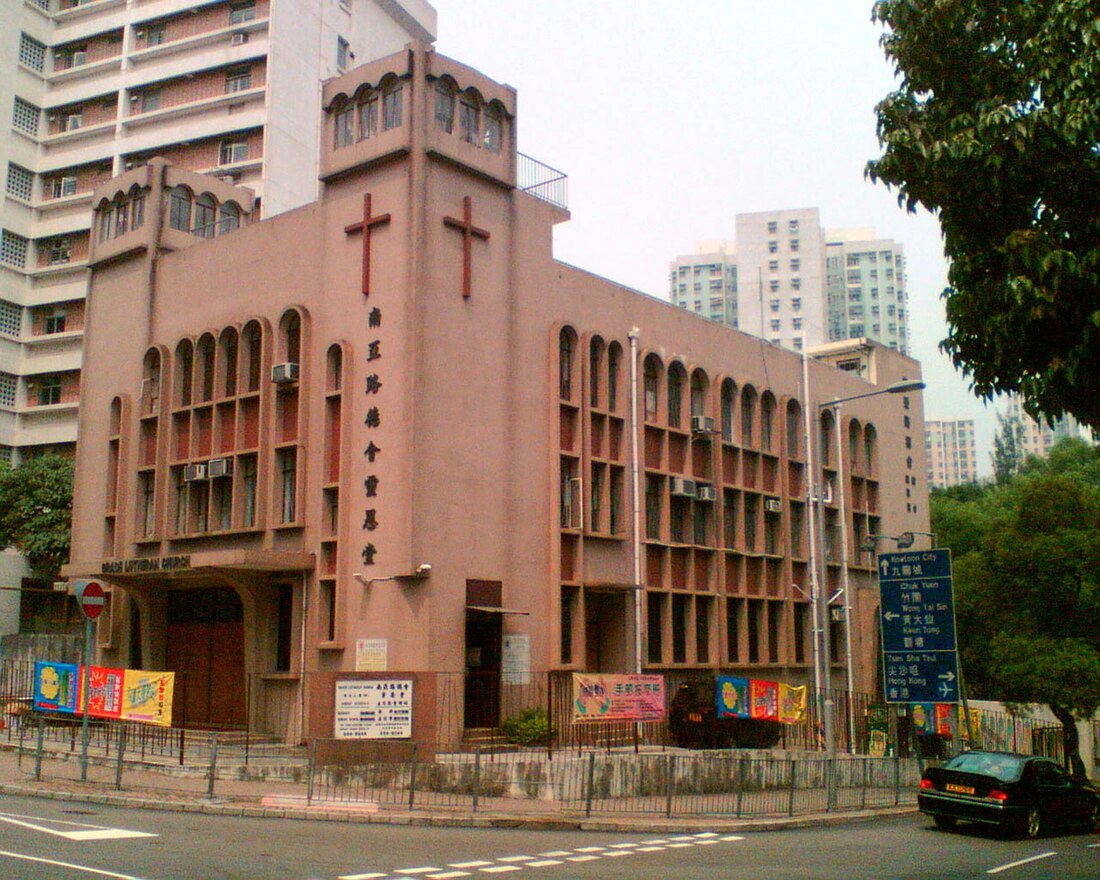南亞路德會
来自维基百科,自由的百科全书
南亞路德會(South Asian Lutheran Evangelical Mission, SALEM)是香港一間屬基督新教的認信路德宗教會,一九七七年由美國母會威斯康辛州路德會(WELS)差派宣教士來港成立。
南亞路德會 SALEM(英文) | |
|---|---|
 南亞路德會大樓 | |
| 類別 | 新教 |
| 宗派 | 路德宗 |
| 典籍 | 希伯來文《舊約聖經》 通用希臘原文《新約聖經》[1] |
| 神學 | 十架神學 |
| 會長 | 謝達超牧師 |
| 決策 | 董事會 |
| 社會服務 | 南亞路德會家庭網社會服務中心 南亞路德會荔景閱讀中心 南亞路德會三聖閱讀中心 南亞路德會朗屏閱讀中心 南亞路德會友愛閱讀中心 |
| 出版社 | 聖臨出版社 |
| 組織 | 世界路德宗認信聯會 |
| 區域 | 香港 |
| 總部 | 九龍廣播道四號南亞路德會大樓二樓 |
| 創始人 | 耶穌基督 (根據教義[2]) |
| 起源 | 1977 香港 |
| 教堂 | 南亞路德會靈恩堂 南亞路德會深恩堂 南亞路德會以勒堂 南亞路德會沐恩堂 南亞路德會沐愛堂 南亞路德會元朗堂 南亞路德會三聖堂 南亞路德會友愛堂 南亞路德會永基堂 南亞路德會筲箕灣堂 |
| 中學 | 南亞路德會沐恩中學 |
| 高等教育機構 | 南亞路德會神學院 南亞路德會聖經學院 |
| 官方網站 | salem.org.hk |
名稱
一九七七年,美國威斯康辛州路德會重組香港的宣教工作,重新成立一個本地教會組織,命名為南亞路德會(South Asian Lutheran Evangelical Mission,簡稱SALEM),由施維德牧師出任主席。「南亞路德會」原稱「東南亞路德會」(East South Asian Evangelical Lutheran Mission, ESAELM),後來把「東」字拿走,只剩下「南亞」,然後再將Evangelical Lutheran 改為Lutheran Evangelical。改變後,英文稱為South Asian Lutheran Evangelical Mission,簡稱為SALEM,而SALEM這也是希伯來文「平安」的英文寫法。[3]
組織
南亞路德會的最高決策權屬於董事會,負責發展和推動本會福音聖工、神學教育和社會服務事工。
現時教會屬下設有十間堂會,包括:
- 南亞路德會靈恩堂
- 南亞路德會深恩堂
- 南亞路德會以勒堂
- 南亞路德會沐恩堂
- 南亞路德會沐愛堂
- 南亞路德會元朗堂
- 南亞路德會三聖堂
- 南亞路德會友愛堂
- 南亞路德會永基堂
- 南亞路德會筲箕灣堂
- 南亞路德會聖經學院
- 南亞路德會神學院
- 南亞路德會沐恩中學
- 南亞路德會家庭網社會服務中心
- 南亞路德會荔景閱讀中心
- 南亞路德會三聖閱讀中心
- 南亞路德會朗屏閱讀中心
- 南亞路德會友愛閱讀中心
教義

南亞路德會為一「認信路德宗」(Confessional Lutheran)教會,「認信」是指教會宣認1580年《協同書》所包含的三大大公信經《使徒信經》、《尼西亞信經》和《阿他拿修信經》,並多份路德宗認信文獻,包括《奧斯堡信條》、《奧斯堡信條辯護論》、《施馬加登信條》、《論教皇權與首位》、《馬丁路德博士大問答》、《馬丁路德博士小問答》及《協同式》。[5][6][2]除繼承普世教會歷史上許多傳統教義,如「三位一體」、[7]《聖經》作為上帝的啟示、[8]「原罪」[9]與「最後審判」等等外,[10]南亞路德會更強調「因信稱義」、[2]「信徒皆祭司」,[11][12][13] 以聖經作為最高權威,[14]
教會根據聖經認為,上帝創世之先,世界是完美和聖潔的。然而,當亞當及夏娃不服從上帝的命令,屈服於撒旦引誘之後,他們便失去了原有聖潔的形象。教會認為上帝的審判臨到他們:「你們必定死」(創世紀2:17)。路德宗神學指出,由於亞當及夏娃的原罪,從由那時起,所有的人都在罪孽受孕、出生(詩篇51:5),心裡只有惡念(創世紀8:21),「從肉身生的,就是肉身」(約翰福音3:6)。由於所有人均死在罪中與上帝隔絕(以弗所書2:1),他們不能藉自己的努力及行為與上帝和好[15]。教會相信耶穌基督是父上帝差來,為要把人類從罪惡與懲罰中買贖回來。根據聖經,上帝的兒子耶穌承擔「我們眾人的罪孽」(以賽亞書53:6),在十字架上把自己獻上作贖罪的祭,成為眾人的贖價(馬太福音20:28),因人類的罪的緣故而死,替代罪人死亡(哥林多後書5:21)。教會堅信耶穌復活,完全肯定了上帝已接納基督為代罪羔羊的確據(羅馬書4:25)。教會亦相信上帝已把所有罪人稱為義(普世稱義),宣告所有罪人因著基督的緣故稱義,「因(耶穌)一次的義行,眾人也就被稱義得生命了」(羅馬書5:18)。路德宗認同這是聖經的核心信息,正是教會存在的意義。南亞路德會相信每個人藉着上帝所賜的信心領受這份禮物,而非藉着人的好行為(以弗所書2:8,9)。路德信仰中所指稱義的「信」就是信賴基督及祂救贖的偉大工作,這「信心」緊守上帝在基督裏預備的救贖(羅馬書3:28;4:5)。路德宗堅信,雖然基督為所有人死,不以信心接受上帝赦罪的人將失去基督為他們贏取的贖罪(約翰福音8:24),「不信的,必被定罪」(馬可福音16:16)。[16][17]
南亞路德會所接受的《施馬加登信條》,當中清楚解釋「稱義」的概念,指出「因信稱義」是基督教信仰的核心:
這是第一條,亦是最重要的條款:耶穌基督是我們的上帝和主,他受死,是為我們的過犯;他復活,是為叫我們稱義(羅馬書4:25)。唯獨祂是上帝除去世人罪孽的羔羊(約翰福音1:29),上帝使我們眾人的罪孽都歸在祂身上(以賽亞書53:6)。世人都犯了罪,卻蒙上帝的恩典,因基督的買贖,憑著耶穌的血,就白白地稱義(羅馬書5:23-25)。由於人必須相信這事,而不能以任何行為、律法或功勞獲得它,所以唯獨此信稱人為義,這是明確的真理…… 即使天、地及今世的事物都要毀滅,在此條款上都不會有甚麼退讓、妥協,更不會認同任何與此相違背的教導。[18]
南亞路德會認為,聖經已表明人得救的唯一途徑是相信主耶穌基督為救主。 [22] 「唯獨信心」也可稱為「因信稱義」[註 1],是整個信仰的核心思想[25]。該會相信,上帝因著耶穌已替人類受罰而免去人的罪,[26][27]而人是單單以上帝所賜的信心,去接受這個赦罪。[28]一個人得拯救,完全是出於上帝的恩典,而不是出於人的善功、行為[29],這有別於東正教與天主教教義,即認為人除信心外亦必須加上善功才能得救[註 2][31][註 3][34][35]。
另一方面,教會亦認為,雖然耶穌基督為所有人死,不信者將失去耶穌基督為他們贏取的赦罪。[36]
教會認為,赦免、生命和救恩臨到罪人身上,完全是上帝所賜的禮物,是上帝差遣聖靈進入人的心裡作工,叫人改變心意(悔改)、認罪並信靠主耶穌基督[37][38]。藉著信心所接受的,是上帝的恩典(禮物)。恩典與信心都是和「行為得救」、「行為稱義」對立的:[39]
聖經也教導:
「唯獨聖經」即是「唯獨以聖經為依歸」,教會相信聖經全都是上帝的默示及無誤的真理,是上帝啟示的唯一來源、教會的最高權威,沒有任何人或傳統可以替代:[19][40]
教會認為聖經更是所有人在信仰和生活上的最高準則,「人當以訓誨和法度為標準。」[41] 教會要作牧養及施行教會紀律只能依從聖經內的教導而行,亦不可以修改或曲解聖經任何字詞內容來迎合屬世的需要[19]:
南亞路德會相信聖經是上帝給所有人無誤、完整的啟示,[42]在對內牧養和對外宣教當中,教會都強調使用聖經所包含的兩大信息,就是「律法」和「福音」,[43][44]信徒亦須清楚分辨兩者。[45]
「律法」宣告在上帝眼中什麼是對、什麼是錯,律法並警告上帝因為罪(意即違背律法[46])要施行懲罰:
律法的主要作用或力量,乃是將遺傳罪及其各種後果表現出來,並指示人知道,他的本性如何墮落到極點及如何敗壞。[47]
「福音」就是耶穌把人從罪惡中拯救出來的好消息,上帝的拯救表明了祂的愛。教會相信整本聖經是以耶穌基督為中心,指出在舊約聖經中上帝屢次應許一位把人從罪惡死亡拯救出來的神聖救贖者。另外上帝在新約聖經中宣告這應許的救贖者「道成肉身」,成為拿撒勒人耶穌:[48]
嚴格來說,福音的內容乃是:要從上帝獲得赦罪,人應當相信上帝的兒子 - 我們的主基督 - 曾親身擔負律法的咒詛,補贖償還我們一切的罪孽,以致唯獨藉基督我們再領受上帝恩典,藉信心獲得赦罪,脫離死亡及罪的一切刑罰而永享救恩。凡賜安慰和上帝慈悲及恩惠給違反律法者,可嚴格稱為福音,即佳美歡樂的信息:上帝不願意刑罰罪過,願因基督的緣故赦免罪。[49]
「信徒皆祭司」,是指所有信徒都擁有祭司的職分,[50]傳上帝的福音。[13]《彼得前書》二章9節向基督徒指出:
惟有你們是被揀選的族類,是有君尊的祭司、是聖潔的國度、是屬神的子民
南亞路德會和其他新教教會同樣認為,所有信徒都可透過中保耶穌基督,直接地、沒有等級地去到上帝的面前[11][51],他們都是福音的使者或僕人,而上帝的旨意就是要所有基督徒跟別人分享救恩的信息[52][13],即「福音」——上帝藉耶穌的犧牲赦免世人罪孽[28]的好消息[53]:
南亞路德會亦認為,基督耶穌再次降臨世上的時候,要坐在寶座上審判全人類: [54][55]
使徒保羅亦指出,基督耶穌就是那位將來在「他的顯現和他的國度」裏,「審判活人死人」的。[56]新教相信,在審判當日,耶穌基督要將眾人(包括活著的和從死裏復活的)分為兩群。至於人被審判的標準,新教認為,耶穌已清楚指出非信徒因為棄絕祂和祂的福音,就會被定罪:[57]
人若拒絕行上帝所喜悅的事,等於為「不信」提供證據。[57]
聖禮
南亞路德會承認洗禮和聖餐兩聖禮[2][58]。因這兩個聖禮是耶穌基督清楚吩咐信徒施行的:
南亞路德會認為聖禮是主耶穌基督親自設立的。這個聖禮是上帝的「施恩具」(施予恩典的工具),藉主耶穌基督所作的事,洗禮使人有得救的信心(創造信心)或使人得救的信心被堅固(堅固信心)。 [59][60]
和其他路德宗教會一樣,南亞路德會根據聖經《福音書》及《哥林多前書》的教導,相信耶穌基督真正臨到聖餐當中(Real Presence),意思是指基督真真正正在「(沒有改變的)餅與酒之內,與餅和酒同在,在餅和酒之下」(In, With and Under the bread and wine), [61][62] 是一種「聖禮的聯合」。 [63][64][65] 凡參與聖餐的人在領受餅和酒時,都同時領受主的真身體及真寶血,所以路德宗的聖餐觀也稱為「同領說」:
我們所祝福的杯,豈不是同領基督的血麼?我們所擘開的餅,豈不是同領基督的身體麼?(哥林多前書10:16)[66]
主設立聖禮時,祂清楚說:「你們拿著吃,這是我的身體...你們都喝這個,因為這是我立約的血,為多人流出來,使罪得赦」(馬太福音26:26,28)。路德宗相信是耶穌基督這句話(而不是人的作為)讓基督臨在聖餐當中。當認罪悔改的信徒領受主的真身體和真寶血時,他們也同時領受罪的赦免(馬太福音26:28),並受安慰及被認定他們是屬於主的。非信徒和否認基督臨在聖餐當中的信徒若領受基督的身體和寶血,只會令他們被定罪:[67][61]
因此,無論甚麼人若用不合適的態度吃主的餅,喝主的杯,就是得罪主的身體、主的血了。所以人應當省察自己,然後才吃這餅,喝這杯。因為那吃喝的人,如果不辨明是主的身體,就是吃喝定在自己的身上的罪了。(哥林多前書11:27-29)[68]
因此,教會既不認同「變質說」(Transubstantiation), [69][70][71][72][73][74] 亦不認同一些學者所指的「合質說」(Consubstantiation),又稱「同質說」。 [75][76][77]
禮儀
除聖經教導的洗禮和聖餐外,南亞路德會的禮儀亦包括堅信禮和轉會禮。
堅信禮是一個教會傳統的禮儀,在已領洗的兒童至十多歲的時候,教會會為他們舉行堅信禮,向教會會眾表明信仰。而轉會禮不是聖經所定的禮儀。一個已領洗的信徒,因著不同的原因,須要由原本所屬的教會轉往南亞路德會時,為了表達一致信仰,在傳統習慣上便會舉行一個轉堂禮,使該信徒可以在會眾面前表示他或她:(一)已接受洗禮;(二)與南亞路德會的信仰是一致的;(三)願意成為南亞路德會會友。[78][59]
歷史
- 一九六三年至一九九七年是宣教士主理會務時期。
- 一九六三年,美國明尼蘇達州「福音路德會」(Minnesota Evangelical Lutheran Synod, 簡稱ELS),差派一位在伯大尼路德會神學院(Bethany Lutheran Seminary)畢業的華人神學生回港成立「遠東中華路德會」(Christian Chinese Lutheran Mission, 簡稱CCLM)。一九六四年,另一美國威斯康辛州路德會(Wisconsin Evangelical Lutheran Synod, WELS)加入支持遠東中華路德會在港的宣教工作。
- 一九七七年,威斯康辛州路德會重組香港宣教工作,重新成立一個本地教會組織,命名為南亞路德會,由施維德牧師出任主席。南亞路德會亦是從年初開始以申辦閱讀中心(自修室)、補習社及學校的形式來建立教會。
- 一九八三年,屬下以馬內利中學(原由遠東中華路德會創辦)搬往大埔大元村的新校舍(並改名為沐恩中學)。以馬內利中學的觀塘校舍結束,以馬內利堂遷到秀茂坪邨第二十八座的蒙恩閱讀中心,一間由南亞路德會申辦的學生自修室,繼續教會的聚會活動。
- 一九九一年建立於屯門友愛邨友愛堂。
- 一九九七年,南亞路德會完成本地化。董事會的主席及兩位副主席都全由本地華人出任。
參見
註釋
參考
參考文獻
外部連結
Wikiwand - on
Seamless Wikipedia browsing. On steroids.
